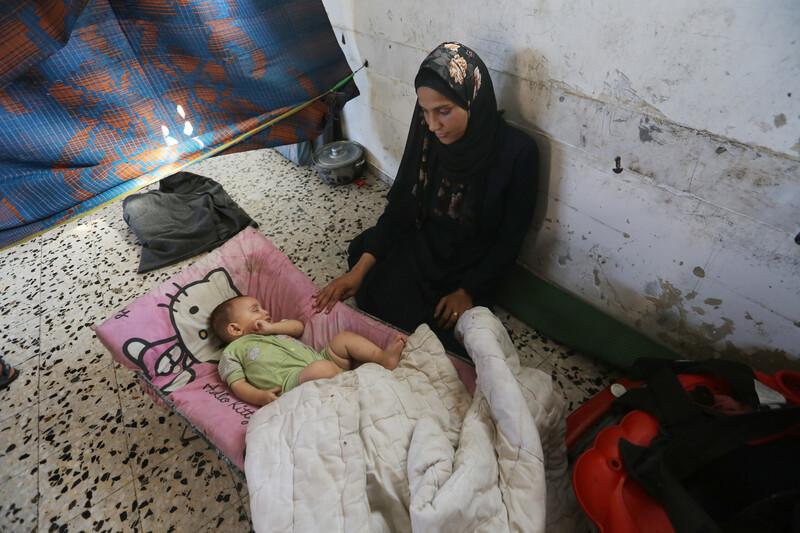Rights and Accountability 13 July 2024

Pregnant and breastfeeding women in Gaza face a myriad of medical, nutritional and psychological challenges amidst Israel’s genocide.
APA imagesThere is no safe place to give birth in Gaza.
Miscarriages in Gaza have skyrocketed 300 percent since before 7 October 2023, according to reproductive health experts.
And women are three times more likely to die in childbirth.
Israel’s ruthless and deliberate targeting of hospitals and health clinics over the last nine months is compounded with a lack of critical supplies and medications necessary to ensure safe deliveries. But this is just part of the crisis, healthcare workers say.
Severe malnourishment, dehydration, exhaustion and psychological stress experienced by pregnant women lead to miscarriages, stillbirths, or low birth weights and developmental delays in newborns.
More than 150,000 pregnant and breastfeeding women face severe challenges in accessing essential prenatal and post-natal care, according to the United Nations agency for sexual and reproductive health.
Save the Children noted that approximately 50,000 babies have been born in Gaza since Israel’s attacks began in early October, “with many women giving birth in traumatic, unhygienic and undignified conditions without access to basic services.”
“The Gaza we see today is no place for a child to be born,” stated Rachel Cummings, the charity’s Gaza team leader.“We know that prolonged exposure to stress and trauma, coupled with substandard medical facilities, can lead to premature labor and death of newborns,” she said.
The organization reported this week that some women in Gaza “are self-inducing labor to avoid giving birth on the move.”
Others, Save the Children says, “are scared to seek vital prenatal care because of fears of bombing and some have lost their lives due to a lack of access to doctors.”
For pregnant women who “defy the odds and manage to carry their pregnancy to full-term, the likelihood is they will be forced to give birth in a tent, a temporary shelter, or even in the streets amid rubble,” stated the aid organization CARE International on Thursday.
“They will do this without painkillers, while bombs continue to drop around them, knowing that they are now three times more likely to die giving birth,” the group warned.
Physicians have told CARE that they have run out of medications, including prenatal vitamins, as well as antibiotics and anesthetics necessary for safe cesarean sections.
Women “are dying in scores from otherwise preventable pregnancy complications,” the organization stated.
“Nine months on, and a woman who conceived at the start of these hostilities will now be giving birth,” stated Ammal Awadallah, the director of the Palestinian Family Planning and Protection Association.“But where, how, and what life is that baby entering? This will be a lost generation in Gaza, a generation born into genocide,” she added.
Starvation accelerates
Israel’s engineered starvation policy in Gaza has led to more deaths of Palestinian children in Gaza this week, leaving “no doubt that famine has spread across the entire Gaza Strip,” according to a new report by United Nations experts.
“We declare that Israel’s intentional and targeted starvation campaign against the Palestinian people is a form of genocidal violence and has resulted in famine across all of Gaza,” the experts stated.
The World Health Organization calculated in February that 90 percent of children under 2 years old and 95 percent of pregnant and breastfeeding women face severe food insecurity.
The WHO stated this week that nearly one of every four people in Gaza is “at risk of starvation.”
The United Nations agency for sexual and reproductive health estimates that nearly all of the 50,000 pregnant women in Gaza are facing either crisis, emergency or catastrophic levels of food insecurity.
Pregnant and breastfeeding women must consume significantly more calories to nourish their babies.
“Any mother who has given birth will have done so lacking the critical support all women need to deliver safely. And any baby born – who manages to survive these conditions – will only have known war,” Save the Children’s Rachel Cummings said.
Deliberate obstruction
Deliberately obstructing prenatal care or access to safe births, of course, is not a new Israeli tactic.
Zionist leaders in Israel and the West have long encouraged genocidal methods against Palestinians and their children.
Fourteen years ago, Martin Kramer of the extreme right-wing Washington Institute for Near East Policy specifically advocated for prohibiting humanitarian assistance to pregnant women in Gaza.
The 1948 United Nations Convention on the Prevention and Punishment of the Crime of Genocide defines genocide to include measures “intended to prevent births within” a specific “national, ethnic, racial or religious group.”Destruction of hospitals
Meanwhile, Israeli soldiers continue their wanton attacks on hospitals and medical facilities across Gaza.
Palestinians had repaired the Patients Friends Association Hospital in the al-Rimal neighborhood of Gaza City after Israeli forces destroyed it, reported journalist Motassem Dalloul.
On Friday, he said that it was once again decimated by Israel.
The al-Ahli Baptist Hospital and the Public Aid Hospital were restored to “partial functionality” as of Thursday, the United Nations reported, after Israel issued evacuation orders on 7 July.“Following the evacuation of these health facilities, the Kamal Adwan and Indonesian hospitals in the North Gaza governorate have been absorbing a large influx of patients while continuing to face severe scarcity of fuel, beds and trauma medical supplies,” the United Nations added.
Doctors Without Borders reported on Wednesday that it was forced to close its last remaining health facility in northern Gaza after coming “under heavy fire.” And the medical organization warned that Nasser Hospital in the southern city of Khan Younis is once again at a “breaking point.” The World Health Organization stated that the Indonesian Hospital in the northern city of Beit Lahiya was absorbing three times its patient capacity, while al-Shifa Hospital, the largest medical facility in the Gaza Strip, is partially functional but at risk.Israeli forces destroyed most of al-Shifa hospital in March, after a two-week siege and a campaign of mass slaughter.
In June, Palestinians began rebuilding parts of the medical complex.





